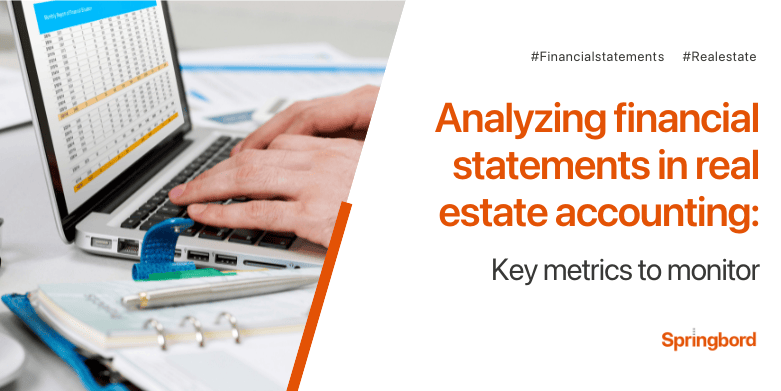 Read time 6 min
Read time 6 minManaging a real estate portfolio comes with a myriad of complexities. From keeping track of multiple properties to ensuring compliance with tax regulations, business owners face numerous challenges in effectively managing their portfolios. As a result, the need for advanced bookkeeping strategies has become increasingly paramount.
At Springbord, we understand the intricate nature of real estate portfolio management and the challenges that accompany it.
Through this guide, we aim to delve into the complexities faced by business owners in managing their real estate portfolios and provide advanced bookkeeping strategies to simplify the process.
Real Estate Portfolio Management Complexities
Managing a real estate portfolio involves dealing with complexities. These complexities stem from various factors, including the diverse nature of property types, fluctuating market conditions, regulatory compliance, and the need for effective financial management.
Real estate portfolio managers face challenges such as optimizing property performance, mitigating risks, and enhancing portfolio transparency.
Additionally, the dynamic nature of the real estate market necessitates constant monitoring and adaptation to ensure optimal portfolio performance.
Challenges Faced by Business Owners in Managing Portfolios
Business owners grappling with real estate portfolio management often encounter a myriad of challenges that hinder their ability to optimize performance and maximize returns.
Some of the key challenges include:
Financial Tracking: Keeping accurate records of rental income, expenses, and other financial transactions associated with each property can be daunting, especially when dealing with multiple properties simultaneously.
Tenant Management: Managing tenant relationships, addressing concerns, and ensuring timely rent payments require proactive communication and effective tenant management strategies.
Regulatory Compliance: Staying abreast of changing regulatory requirements, zoning laws, and tax implications is crucial to avoid legal penalties and compliance issues.
Property Maintenance: Regular maintenance and upkeep of properties are essential to preserve their value and attract tenants. However, coordinating maintenance activities across multiple properties can be logistically challenging.
From advanced real estate bookkeeping services to innovative software solutions, Springbord empowers businesses to optimize their portfolio performance and achieve their strategic objectives.
Real Estate Portfolio Dynamics
Managing a diverse portfolio requires an understanding of various dynamics.
From commercial properties to residential rentals, each asset class comes with its own set of challenges and opportunities.
Components of a Real Estate Portfolio
A real estate portfolio typically consists of a diverse range of assets, each serving different purposes and generating varying streams of income. These components may include:
Residential Properties: Single-family homes, multi-family units, condos, and apartment complexes offer stable rental income and long-term appreciation potential.
Commercial Properties: Office buildings, retail spaces, warehouses, and mixed-use developments yield higher returns but may have higher operational costs and leasing risks.
Vacation Rentals: Short-term leased properties like vacation homes and Airbnb rentals provide alternative income streams but require diligent management.
Land Investments: Land parcels for development or speculation offer potential capital appreciation but may have longer holding periods and are subject to market fluctuations.
Real Estate Investment Trusts (REITs): REITs provide diversification through indirect ownership of real estate assets, offering liquidity and access to specialized sectors like healthcare and hospitality.
Importance of Robust Bookkeeping Practices
Robust bookkeeping practices serve as the foundation for success In real estate portfolio management.
Financial Transparency: Accurate and timely financial reporting provides stakeholders with transparency into portfolio performance, enabling informed decision-making and risk management.
Tax Compliance: Proper bookkeeping ensures compliance with tax regulations, maximizing tax efficiency and minimizing the risk of audits or penalties.
Strategic Planning: Detailed financial records facilitate strategic planning, allowing investors to identify opportunities for portfolio optimization, asset allocation, and growth strategies.
Advanced Transaction Recording Techniques
Effective transaction recording is important for the financial management of any business, especially in the realm of real estate.
From tracking rental income and expenses to monitoring property acquisitions and sales, accurate recording of transactions is essential for optimizing portfolio performance and ensuring compliance with regulatory requirements.
Leveraging Automation Tools
Automation tools streamline transaction recording, minimizing errors and saving time for real estate professionals. Software solutions like QuickBooks or specialized real estate accounting software offer:
Bank Feed Integration: Automated synchronization with bank feeds enables real-time transaction recording, reducing manual data entry and ensuring accuracy.
Rule-Based Transaction Categorization: Setting up rules based on transaction descriptions or amounts automates categorization, simplifying income and expense classification.
Scheduled Transactions: Automating recurring transactions such as rent payments or utility bills ensures timely recording without manual intervention.
Implementing Blockchain Technology
Blockchain technology provides unparalleled transparency and security in transaction recording, revolutionizing real estate management. Key benefits include:
Immutable Ledger: Transactions on a blockchain are tamper-proof, ensuring a secure and transparent audit trail for all real estate transactions.
Smart Contracts: These allow automated execution of contractual agreements, like rental agreements or property transfers, based on predefined conditions. This eliminates intermediaries and reduces transactional friction.
Fractional Ownership: Blockchain enables fractional ownership of real estate assets through tokenization. Investors can trade digital tokens representing ownership stakes in properties.
Springbord specializes in leveraging advanced technologies and innovative strategies to optimize transaction recording processes in real estate, ensuring efficiency, accuracy, and compliance.
Cash Flow Management and Forecasting
Cash flow management is a fundamental aspect of financial strategy for businesses across industries.
Cash Flow Management
Cash flow management involves monitoring the inflow and outflow of cash within a business.
It encompasses tracking revenue from sources such as rental income, property sales, and ancillary services, as well as managing expenses like mortgage payments, property maintenance, and taxes.
The Role of Forecasting
Cash flow forecasting involves predicting future cash inflows and outflows based on historical data, market trends, and business projections.
By forecasting cash flow, real estate professionals can anticipate potential liquidity issues, plan for major expenses, and identify opportunities for investment or expansion.
Strategies for Effective Cash Flow Management
Several strategies can help real estate professionals manage and forecast cash flow effectively:
- Regular Monitoring: Continuously track cash inflows and outflows to identify trends and anomalies.
- Expense Reduction: Implement cost-saving measures to minimize expenses without compromising on quality.
- Diversification: Diversify revenue streams to reduce reliance on a single source of income.
- Emergency Fund: Maintain a reserve fund to cover unexpected expenses or revenue shortfalls.
- Risk Management: Identify and mitigate risks that could impact cash flow, such as market fluctuations or tenant defaults.
At Springbord, we specialize in providing tailored solutions for cash flow management and forecasting and leverage data analytics, industry insights, and cutting-edge technology enables us to empower businesses with the tools and strategies they need to optimize cash flow and achieve their financial goals.
Portfolio Performance Analysis
Analyzing the performance of a real estate portfolio is essential for investors and property managers to assess the profitability and effectiveness of their investment strategies.
Importance of performance analysis
Portfolio performance analysis involves evaluating the financial returns and risk-adjusted performance of a real estate portfolio within a specific timeframe.
Return on Investment (ROI): Calculating ROI helps assess the profitability of real estate investments by comparing net profit to the initial investment.
Net Operating Income (NOI): NOI measures income-producing property profitability by subtracting operating expenses from rental income, indicating property performance and cash flow.
Total Return: Total return considers both capital appreciation and income generated from real estate investments, providing a holistic view of portfolio performance.
Risk Metrics: Evaluating metrics like volatility, beta, and Sharpe ratio helps gauge the risk-adjusted returns of portfolios and compare them to benchmarks or industry standards.
Methodologies for Portfolio Performance Analysis
To effectively analyze real estate portfolio performance, various methodologies and techniques are utilized:
Benchmarking: This involves comparing portfolio returns with relevant benchmarks like industry indices or peer group averages to gain insights into relative performance.
Scenario Analysis: By conducting scenario analysis, investors can assess how different market conditions and economic scenarios may impact portfolio returns and risk exposure.
Sensitivity Analysis: Sensitivity analysis quantifies how changes in key variables such as interest rates, occupancy rates, and property valuations affect portfolio returns.
Attribution Analysis: This dissects portfolio returns to identify performance drivers like asset allocation, property selection, and investment timing.
Employing these methodologies enables investors to understand their portfolio’s performance drivers and make data-driven decisions to optimize returns.
Through advanced methodologies and expert insights, at Springbord, we empower investors and property managers to optimize their portfolios, achieve their financial objectives, and drive sustainable growth.
Conclusion
Navigating complexities requires expertise, innovation, and strategic foresight. From leveraging advanced bookkeeping techniques to implementing technologies like blockchain and automation, businesses are equipped with the tools needed to streamline operations, optimize cash flow, and enhance portfolio performance.
Our expertise at Springbord, advanced bookkeeping, cash flow management, and portfolio performance analysis enable businesses to make informed decisions, mitigate risks, and achieve their financial objectives.
Ready to simplify your real estate portfolio management and unlock growth opportunities?
Contact Springbord today to learn more about our comprehensive solutions and how we can help optimize your portfolio performance.







